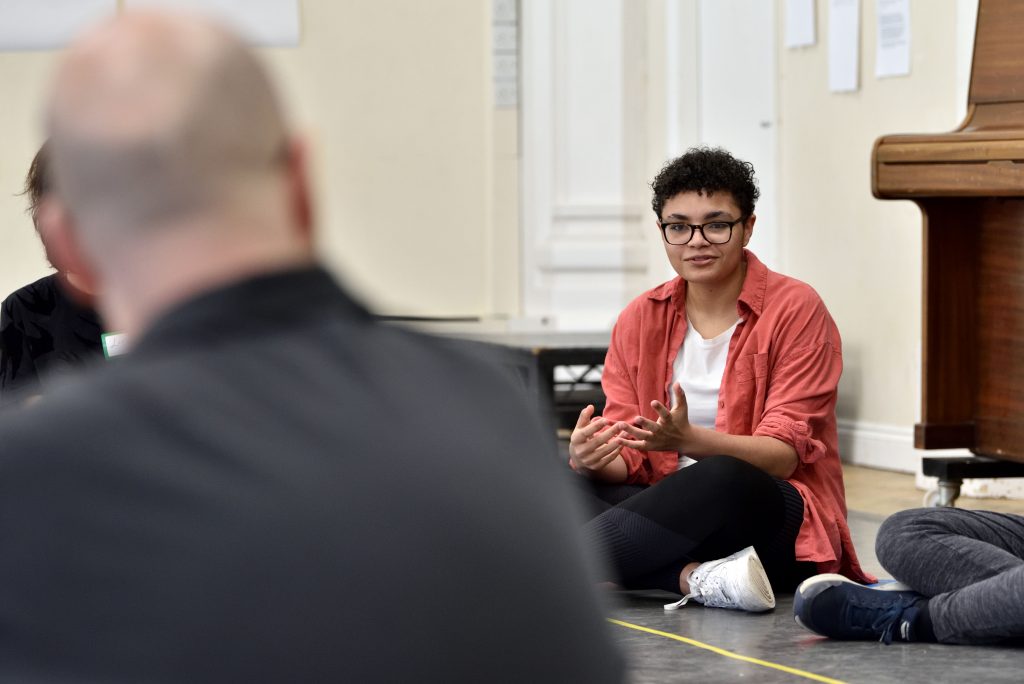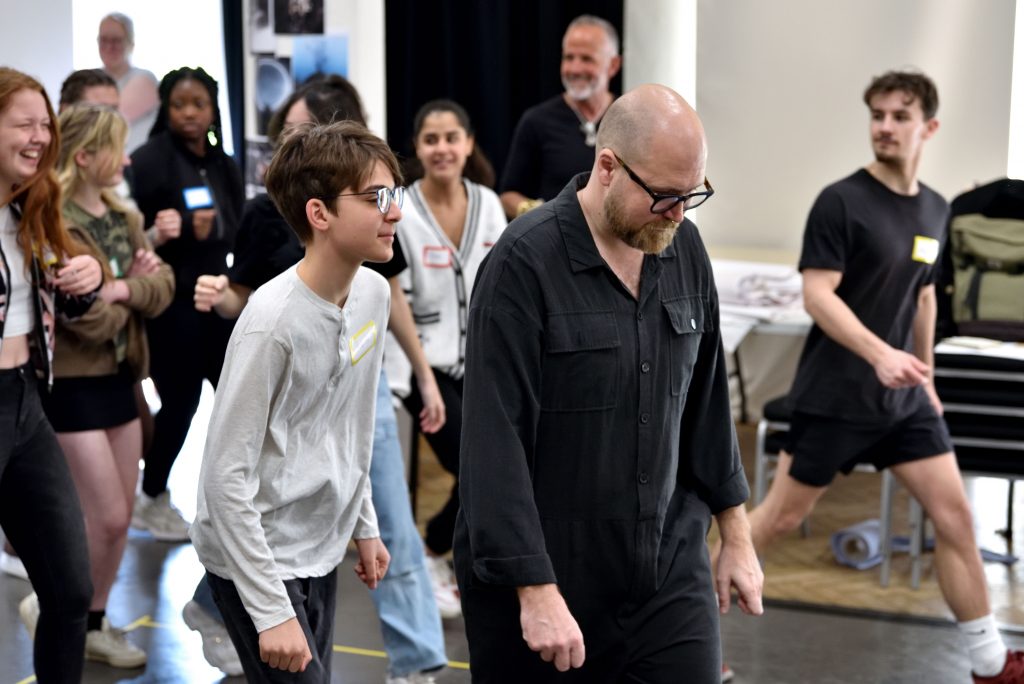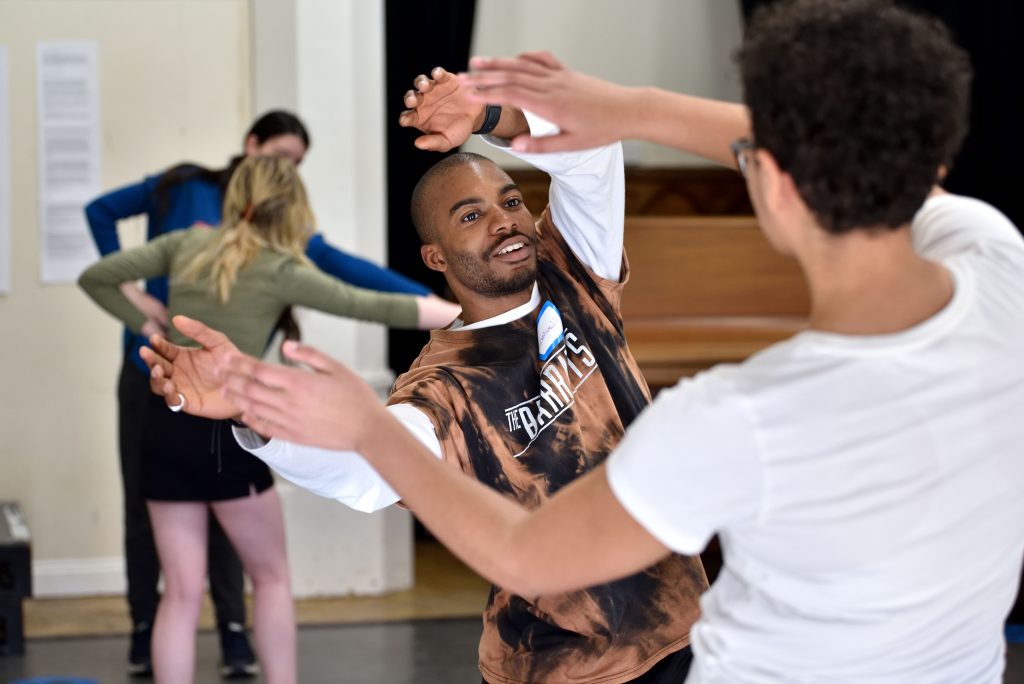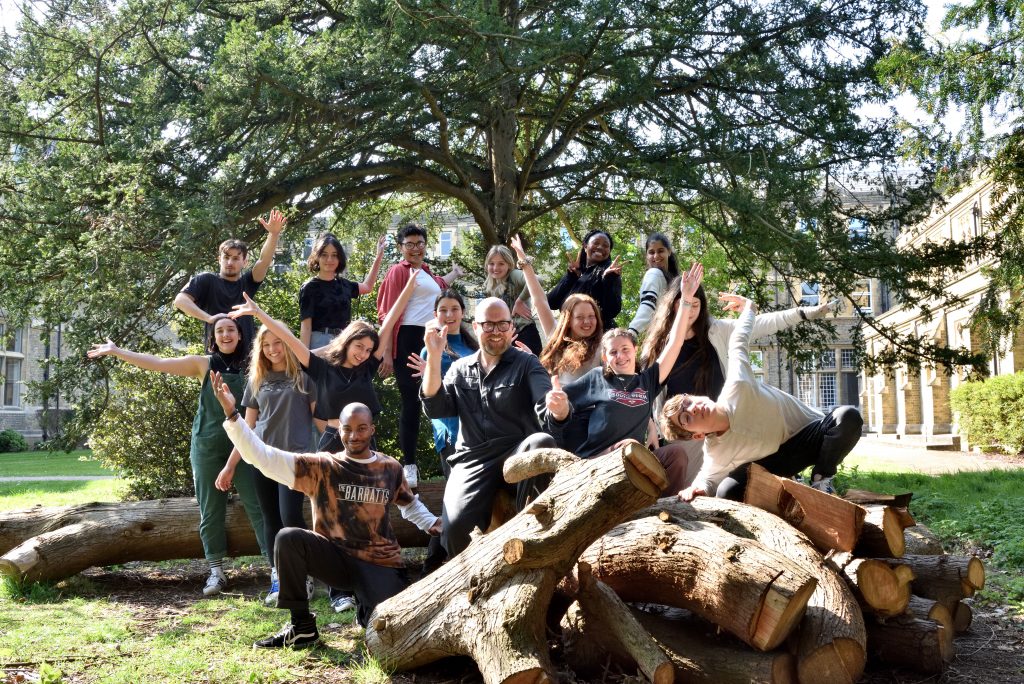Daniela has been a Saturday Club tutor for two years and has seen it transition from a Writing&Talking Saturday Club to the Club it is today. She studied a BA in Acting and is also pursuing an acting career, and has performed in spaces including The Lyric Hammersmith and The Omnibus Theatre. Daniela is an experienced facilitator, having worked with individuals with special educational needs and young carers. She is very passionate about accessibility in the arts and strongly believes in breaking down boundaries for all and that the arts should be an accurate representation of people from all over the world, from all walks of life.
How did you approach the curriculum planning for your Saturday Club?
I knew that to begin with we needed to get to know each other and make sure it was a space we could be open and truthful and explore things in. I also knew that it was going to end with a show, because with acting there are so many transferable skills on offer, for example building the confidence to smash a presentation at school or walk into a job interview in the future.
I wanted it to be of a high professional standard, to show them that they could do it. We had a tech show, a dress rehearsal, a videographer, and photographer. There was a level of professionalism because I think if you set the expectations, you can show them that you trust in them and know what they’re capable of. I’m a big believer in the fact that multiple minds are better than one, so it was definitely a research and development process with regards to listening to the people in the room and asking them what themes they wanted to explore. We’re sociable beings by nature. We’re meant to be integrating and collaborating.

You could also argue that by the age of thirteen, child development is in its final stages. I think it’s such an important age group because it’s potentially just on the cusp of becoming quite insular and insecure, especially because of society’s norms and the pressures from school and social media. I don’t feel like I’m necessarily getting in there before that happens, but I think it’s giving them the space to be themselves and shake those pressures off. Sometimes sessions nicely align with the Club members’ GCSEs and they’re like wow, devising is so much easier in this environment. I think maybe for GCSEs there’s another level of pressure. It is strange, isn’t it? You go from Maths to English to Spanish to suddenly standing in a room where there’s no tables and chairs and you’re told to create a world. Whereas, on a Saturday we have three hours to check in, play some games, and make ourselves look silly. By the time we get to the creating a world bit, it’s not too far-fetched. It’s well within our grasp.
Why do you think it’s equally important for adolescents to learn through play as it is for children, in terms of their overall well-being?
I think it’s just going back to your instincts. Play really helps to unlock those instincts without inhibitions. Like, from the get go, we’re gonna do this exercise or we’re gonna do this session and I want you to be silly and I want you to make mistakes. Everything’s out on the table and all options are available. You’re able to find the joy in things because there are no parameters or pressures. I think that’s why I lead with play. That’s where you can find those juicy nuggets of theatre or those really cool ideas that have come from something completely outlandish, and then you find out that actually, they’re rooted in truth. It’s about re-defining ‘mistakes’, too, because ‘mistake’ turns into ‘failure’ as an adult and then the pressure and the stakes get higher. Being able to learn and develop through play is really important because it’s just a nice way of saying, even as adults, let’s rip up the rule book for three hours and do what we want.

How do your experiences as a creative feed into the learning environment?
For starters whenever I’m in class and I’m taught a new fun game I steal it and bring it back to the group! I love sharing games with people. Having had the privilege of working and experiencing lots of different creative environments in the industry and seeing acceptance and kindness first hand, it really gives me hope that creatives and facilitators are making sure that our actors are safe, and have rights and voices. I hope I lead by example and being able to go into a session on a Saturday and be like, ‘there are places out there where you have a voice’ is amazing. There is still work to be done but this is why these Clubs are essential.
What methods do you use to encourage the exploration of diverse perspectives, and promote inclusivity in the theatrical space?
I tend to target my check-in questions quite a lot, and that’s also been a learning curve for me. When it comes to like Christmas, not everyone celebrates Christmas, or when it comes to Easter, not everyone celebrates Easter. Questions surrounding those times can be rephrased as ‘what does this holiday look like to you?’ or ‘what’s a tradition specific to your family?’ Now the question isn’t ‘how’s your Christmas?’ it’s ‘what did you do over the holidays?’ I hope that I’m trying to encourage the knowledge that there are multiple beautiful and diverse ways of living life.
We do check-ins like that every session. Name, pronouns, and how you’re feeling. After the first session we know what we’re all going to say but we still do it. It’s an opportunity to warm up to those connections, and for them to assert themselves in the space.
How can you empower an individual while also addressing the collective needs of a group?
This is the question I posed to other Saturday Club tutors at the Performance&Theatre online forum. The reason I gave this question is because it’s genuinely something I’d had a challenge with.
When it comes to individuals being a bit quiet or insular and not feeling very comfortable in a space, I think it’s very important to reduce the size of groups. So, you can do your big group setting and a silly competitive game (because I feel like an element of competition always brings people out of their shell) but it’s then very important to reduce the group down. It’s then easier as a tutor to buzz about to try and get to know that person, and everyone else, on an individual level. One Club member was exploring their use of pronouns and the space they take up in the world. He had said he didn’t want to be on stage but by the end… he was on stage! I’m not sure that would’ve been possible if I hadn’t taken the time to get to know him as an individual. It’s important he knew he could take up that space. Our student ambassadors are also amazing. They’re all active participants and they jump in with two feet regardless of what I throw at them. It instantly creates an accepting environment.

Can you share some memorable moments or experiences from your role as a Saturday Club tutor?
There’s a specific improv exercise we did where there’s a simple prop in the middle of the room, a dry shampoo can for example. One at a time you go up and turn it into something that isn’t a dry shampoo can. Normally, these improv games work off the basis that you take it in turns one at a time, so there’s a clear audience and a clear performer. We did it where an additional person joins and suggests that the object is something new, and you have to go along with it. The dry shampoo can became a car, the car became an endangered animal, the endangered animal became an Oscar… and suddenly all thirteen Club members were erupting into applause: ‘thank you for this Oscar award!’ It was so much fun knowing that everyone was on the same page. Everyone was listening. Everyone had each other’s backs. It was a nice moment for me as a tutor, because I was like, ‘I’m doing what I need to be doing. We’re okay.’
The Performance&Theatre Saturday Club at St Mary’s University explores voice, movement and play to develop important skills like listening, reacting, and responding. Club members devise short pieces together, which are later built into a fully devised show performed to family and friends. Find out more about the Club.




Performance&Theatre Saturday Club members from St Mary’s University in a Masterclass with Senior Rehearsal Director Ed Burnside.
Interview conducted and edited by Anisha Jackson